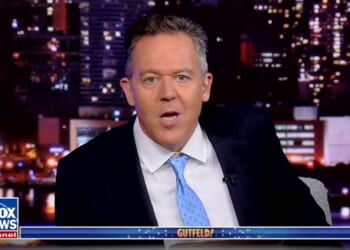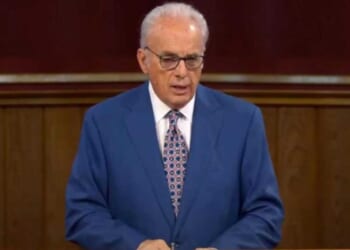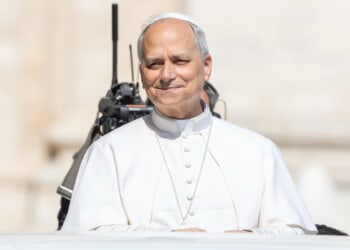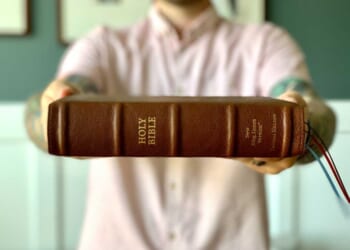President Donald Trump’s criticism of the 1989 Supreme Court decision Texas v. Johnson, which legalized burning the American flag, is deserving of great respect, notwithstanding some problems with it.
Trump was right to say, “The people in this country don’t want to see our American flag burned and spit on.” This alone is not sufficient reason to ban flag burning, but it is not irrelevant to the issue. More important, he was right to sneer at the high court when he said, “[T]hey called it freedom of speech.” This needs to be expanded upon to understand why he is not off-base.
Two cheers for Trump. His reason for sneering, however, is not deserving of a third cheer.
“But there’s another reason [besides free speech] which is perhaps much more important,” he said, “it’s called death. Because what happens when you burn a flag is the area goes crazy.” He argued that flag burning “incites riots” and that those who are convicted would face a year in prison.
The problem with this formulation is that it is a recipe for stifling any speech deemed controversial. We’ve been down this road before.
In 1949, the Supreme Court exonerated a suspended Catholic priest, Father Arthur Terminiello, after he made an inflammatory speech in Chicago. He was arrested and prosecuted for breaking a Chicago ordinance prohibiting speech deemed to “stir the public to anger” or create a disturbance.
If his conviction had not been overturned, a mob could threaten to riot whenever they learned that someone whom they disagree with was scheduled to speak at a particular venue. This is what legal analyst Harry Kalven called the “heckler’s veto.” It puts the blame on those who want to express themselves.
Ergo, Trump’s rationale for objecting to the Supreme Court’s decision allowing flag burning is a nonstarter. But is also wrong to say that he has no basis for objecting to that ruling. Conservative pundit Dana Loesch errs when she says, “the government has no right to control speech or expression.” …
Two Cheers for Trump’s Stance on Flag Burning | The American Spectator
Related Posts
Steak ’n Shake Mocks Cracker Barrel Over Identity-Erasing Rebrand [WATCH]
Steak ’n Shake has publicly criticized Cracker Barrel following the…
‘Be Reasonable’: Chris Pratt Roasts Anti-Trump Americans ‘So Mired In Hatred’ They Reject His ‘Success’
Actor Chris Pratt on “Club Random” Monday mocked Americans who despise President…
DeSantis defiant after Obama judge orders Alligator Alcatraz closure
America’s Governor had a blunt response to a “preordained” order from a…
Greg Gutfeld Has a Major Reality Check for Lefties Clutching Pearls Over the FBI’s Bolton Raid – Twitchy
The FBI's raid at the home and office of John Bolton was an…
L.A. Mayor Karen Bass Is Big Mad Because the Big Beautiful Bill Prioritizes Immigration Law Enforcement – Twitchy
During Rep. Hakeem Jeffries' attempt to stall the vote on the…
USA Today Goes Full Science Denier In Simone Biles-Riley Gaines Transgender Sports Debate
In a recent opinion column for USA Today, sports writer Nancy Armour defended…
Just Following ORDERS? Newly Released Peter Strzok Doc Is NOT a Good Look for James Comey OR … Obama – Twitchy
Another day, another post illustrating how evil, corrupt, and downright…
Mount Rushmore Could Get Trump Upgrade Under GOP Push [WATCH]
Rep. Andy Ogles (R-TN) has formally requested that President Donald Trump be…
Soros Network, Others Behind LA Riots [WATCH]
As protests and riots continue across Los Angeles in response to ongoing…
Human Trafficking Expert Details Horrific Biden Admin Endangerment of Migrant Kids [WATCH]
Ali Hopper, president and founder of GUARD Against Trafficking, testified before…


![Steak ’n Shake Mocks Cracker Barrel Over Identity-Erasing Rebrand [WATCH]](https://www.right2024.com/wp-content/uploads/2025/08/Steak-n-Shake-Mocks-Cracker-Barrel-Over-Identity-Erasing-Rebrand-WATCH-350x250.jpg)





![Mount Rushmore Could Get Trump Upgrade Under GOP Push [WATCH]](https://www.right2024.com/wp-content/uploads/2025/07/Mount-Rushmore-Could-Get-Trump-Upgrade-Under-GOP-Push-WATCH-350x250.jpg)
![Soros Network, Others Behind LA Riots [WATCH]](https://www.right2024.com/wp-content/uploads/2025/06/Soros-Network-Others-Behind-LA-Riots-WATCH-350x250.jpg)
![Human Trafficking Expert Details Horrific Biden Admin Endangerment of Migrant Kids [WATCH]](https://www.right2024.com/wp-content/uploads/2025/07/Human-Trafficking-Expert-Details-Horrific-Biden-Admin-Endangerment-of-Migrant-350x250.jpg)





